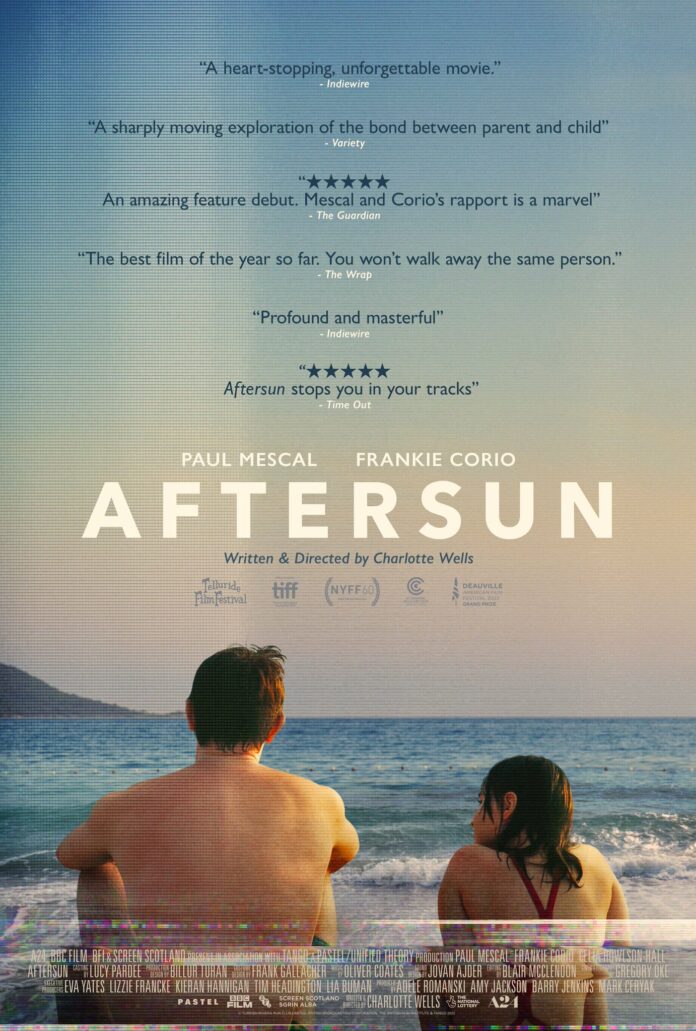The nostalgic cinematography allows the audience to see the innate complexity of parent-child relationships
By ANA BACH — arts@theaggie.org
“Aftersun,” the directorial debut from Charlotte Wells, is an A24-produced film that premiered in theaters on Oct. 21 of last year. Frankie Corio plays narrator Sophie, through whom we see a story almost entirely made up of flashbacks of a vacation to Turkey she took with her father Calum when she was 11. The film is shot through Sophie’s perspective as an adult, looking back through camera recordings of the trip, which brings up recollections of the vacations’s niche details and experiences. Throughout, she reflects on what her father was going through at that time while she experiences similar feelings in her adult years.
While the film is ambiguous, providing little context about Sophie and Calum’s relationship outside of the trip, the mental health struggles that Calum is dealing with or what happened to him when they returned from Turkey, but that background isn’t really necessary. If anything, the vagueness of the film makes the underlying themes more malleable to anyone watching, allowing viewers to fill in the gaps and add anecdotes to find personal relevance within the storyline.
The film does a beautiful job of capturing nostalgia through texture and composition. The natural light, color scheme and hazy nature of the old camcorder clips give the film its special backbone and unique character. Even the more simple moments captured on screen have an extreme beauty about them that resembles the way memories imprint in our minds; specific but mundane moments, like skin glistening in the sunlight or the feeling of someone you love’s hand applying lotion to your sunburn, turn into emotionally rich memories.
The distinct texture in this movie produces the foundation for the dichotomy between the moments captured on camera and the memories that Sophie remembers. The texture that comes from memory is so vivid as the saturation comes more to life, especially since Sophie is reliving these experiences that she formed as a child. The moments of flashback have ab undertone of euphoria, created by warm-toned light and increased saturation. The filming and editing styles contribute significantly to the plot of the movie — so much so that it is just as valuable as the characters and their dialogue.
Throughout the film, it is made clear that Calum is battling depression and other emotional turmoil. One part specifically shows an 11-year-old Sophie recording him and asking where he thought he would be 20 years down the line when he was her age. At first, he is hesitant to respond but eventually admits that he is surprised he even made it to 30 and struggles to see himself at 40.
The film also shows the complex relationship that a father like Calum has with a child who expresses negative emotion. In a moment where the two of them are sitting in a hotel room, Calum asks Sophie how she feels after the day. She says, “I don’t know. Don’t you ever just feel like you’ve just done a whole amazing day, and then you come home and feel tired and down and feel like your bones don’t work? They’re just tired, and everything is tired. Like you’re sinking.”
Upon hearing this, Calum spits at the mirror in front of him. He is hypersensitive to the idea that his daughter is, or might in the future, experience the same emotional turmoil he often does.
Another important moment in the movie occurs when Sophie and Calum are talking by the pool. Sophie says, “I look up to the sky, and if I can see the sun, then I think about the fact that we can both see the sun. So, even though we’re not actually in the same place, and we’re not actually together, we kind of are in a way, you know? Like we’re both underneath the same sky, so we’re kind of together.”
The sun seems to be the thing that unites them most in their current relationship, but it is also one of the farthest things from all of us. This moment alludes to the fact that even though Sophie and her father no longer have a relationship in present day, they are still connected.
“Aftersun” reminds younger that parents are also experiencing a phase of life for the first time and helps them to feel empathy and understanding for parental figures. There is an inner child that perhaps never leaves us, even as we age into adulthood, and I think it is extremely powerful to see that portrayed on screen. Wells has created a movie that reminds us that just as we all live under the same sun, we likely share many of the same experiences.
Written by: Ana Bach — arts@theaggie.org




